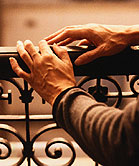Changes in Seniors' Sleep Patterns Need Attention
Disrupted rest lasting more than 2 weeks should be brought up with doctor, expert says.
|
E-mail this article
Subscribe to news
Printer friendly version
|

(SOURCE: American Geriatrics Society, news release, August 2008)
SATURDAY, Sept. 13 (HealthDay News) -- While it's normal for older people to have occasional sleep problems, seniors who experience sleep pattern changes that last for longer than two weeks should see a doctor, says Dr. Charles Cefalu, a member of the American Geriatrics Society.
"Generally, for optimal function, the body and mind need about eight hours of sleep each night," Cefalu said in a society news release. "However, a recent study suggests that some seniors may need less sleep. Because sleep affects everyone differently, people shouldn't count the hours of sleep they get to determine if it's right for them, they should take note of how they feel the next day."
He noted that common signs of a sleep disorder include: excessive snoring; frequent waking through the night; morning headaches; being tired but having trouble falling asleep; loss of appetite; and not feeling rested in the morning.
"While it might be normal to wake up tired, or have a bad night's sleep on occasion, if the symptoms last for more than two weeks, seniors should see their geriatrician to determine if there is a problem and learn about treatment options," Cefalu said.
Cefalu offered some tips to help seniors get a good night's sleep:
- Maintain a sleep schedule with consistent sleep and waking times, even on the weekends. This type of regular schedule helps keep the mind and body in-sync.
- Don't consume caffeinated beverages and foods after 2 p.m.
- Eating a light dinner earlier in the evening may help restless sleep, while eating a late meal may be too heavy on the stomach and make it more difficult to have a comfortable sleep.
- Get rid of unnecessary light in the bedroom. Even a bit of light from digital clocks or TVs can disrupt sleep cycles. Turn digital clocks away from the bed and don't fall asleep with the TV on.
- Exercising 30 minutes to 40 minutes, three to four times a week, will help promote a more restful sleep. It will also improve cardiovascular health, weight maintenance, osteoporosis and diabetes -- all of which can affect sleep.
- Seniors who have trouble falling asleep at night shouldn't take long naps during the day, because naps can make it more difficult to fall and stay asleep at night.
More information
The U.S. National Institute on Aging has more about sleep and aging.
Copyright © 2008 ScoutNews, LLC. All rights reserved. 
HealthDayNews articles are derived from various sources and do not reflect federal policy. healthfinder.gov does not endorse opinions, products, or services that may appear in news stories. For more information on health topics in the news, visit the healthfinder.gov health library.